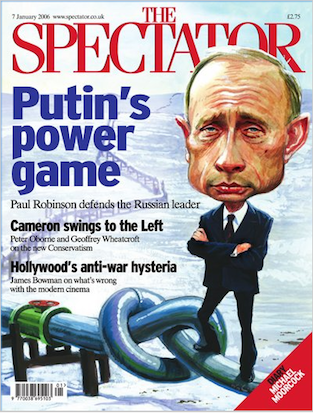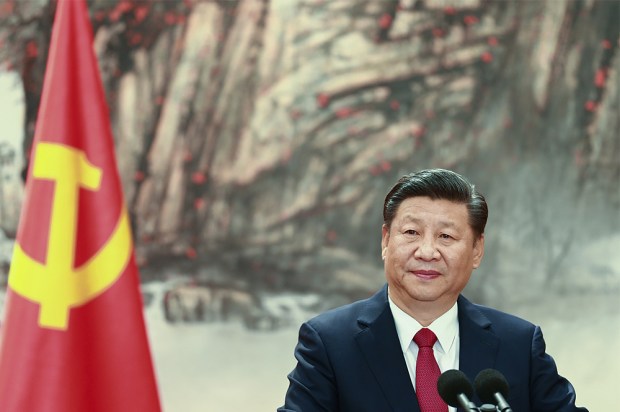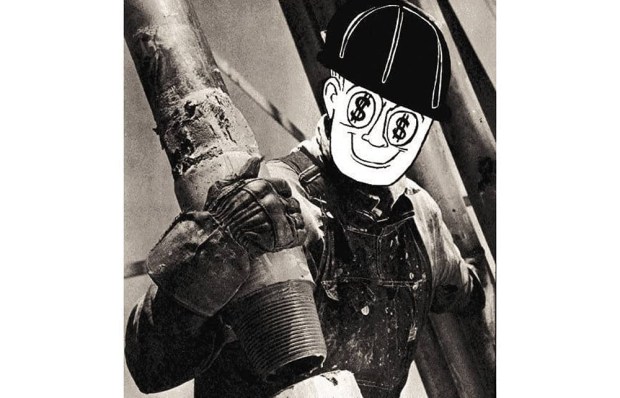To have written last month that the headline ‘Kiev in flames’ looked like a black swan on the economic horizon hardly makes me Nostradamus — but sure enough, the tension between Russia and Ukraine have caused stock markets to quiver and the price of UK gas for one-month delivery on the ICE Europe futures exchange in London to rise 10 per cent on Monday. But it was more impressively far-sighted that way back in the winter of 2005/6 we commissioned a Spectator cover showing wicked Vladimir Putin sitting astride a knotted gas pipeline: one sixth of all gas consumed in Europe arrives from Russia across the Ukraine, and another sixth from Russia by other routes. Twice before, Putin has provoked western price spikes by turning off supplies to Ukraine, supposedly for late payment but also as a political warning.
There would have been more market turmoil this week if it wasn’t for the fact that, after a mild winter, our continental neighbours are sitting on their biggest stockpiles of fuel since 2008. Most have invested heavily in gas storage capacity, equivalent in Germany to 100 days’ supply, in France to 15 weeks, in Austria to six months. But let us remind ourselves just how completely prescience, investment and ministerial action have failed to cohere in UK energy provision. Here we can hold just a fortnight’s gas (only Belgium has as little capacity as we do), and last September, for want of a subsidy deal, Centrica abandoned a project to re-use the depleted Baird gas field off the Norfolk coast which would have doubled that capacity.
Meanwhile, in the face of green hysteria and rampant nimbyism, the likelihood of shale gas coming on stream from domestic UK sites any time soon is remote; and there’s barely a spade in the ground at Hinkley Point, where the sole new nuclear station so far signed for, at giant cost, won’t be keeping anybody’s lights on until at least 2023. Whatever happens next in the Ukraine crisis, we too depend on the mercy of Mr Putin — though thankfully at a distance.
Fridge frenzy
I hope it wasn’t my fault. A month ago I wrote in praise of a relatively unknown Bolton-based online white-goods retailer called AO.com which was lining up for flotation. I liked the upbeat spirit of its founder John Roberts, with his focus on making sure his workforce enjoy their jobs — and perhaps it was Any Other Business readers, hunting as a pack, who drove the shares to a peak almost 45 per cent above the issue price on the first day’s trading last week. Even after settling back to a 33 per cent premium, the debut gave AO a slightly ridiculous valuation of £1.6 billion — comparable with Dixons, whose profits are ten times bigger. Hundreds of institutions were said to be chasing AO shares, led by hedge-fund wizard Crispin Odey — who I don’t know, but whose genial appearance and worldly tone certainly suggest a Spectator devotee.
The trouble is that this kind of market frenzy gives ‘a whiff of financial sophistication’ — as I labelled it in the comparable case of Ocado, the online grocer — to what is at core an admirable and progressive company. Fund managers disappointed by small share allocations have bad-mouthed the AO float as ‘way overpriced’, while cynics have observed that John Roberts (now, on paper, as rich as J.K. Rowling) took out £86 million in cash while his bankers collected at least £20 million in fees, but only £40 million of the float proceeds will be reinvested in the future of the business.
Roberts — a former kitchen salesman made good, rather than a financier like the men behind Ocado — needs to be careful not to let his standing as an authentic entrepreneur be tainted by the market’s eagerness to make a fast buck out of him and his shares. The AO stampede is, after all, a reflection of trends far beyond his influence. The first is a renewed tendency, emanating from the US, to overhype anything with an internet connection. Could there be a sillier price than the $19 billion paid by Facebook for the mobile messaging service WhatsApp, which has 450 million users but no obvious idea how to monetise them? That makes a profitable Lancashire fridge-seller look like a rock-solid business model — but Facebook founder Mark Zuckerburg says WhatsApp is worth even more than he paid for it, because ‘it’s on a path to connecting a billion people’, and his fans probably believe him.
Secondly, a general return of confidence combined with continuing dismal returns on cash has created a pent-up appetite for new issues in London which was far more startling in the seven-times over-subscription of the Royal Mail privatisation last year – and is also set to drive demand for current offerings by Pets at Home and Poundland. I wrote last autumn that ‘the money you save by shopping at Poundland may well be worth fluttering on a few of its shares’, so I suppose I’ll be blamed for that one too.
The delusion in all of us
I’ve been busy this week directing an amateur production of Yasmina Reza’s God of Carnage, a cruel satire on bourgeois manners that famously includes an episode of projectile vomiting (we opted for Innocent’s strawberry-banana smoothie, in case you’re wondering). It also includes a fine cameo of financial sophistication in the character of corporate lawyer Alain, who interrupts the domestic strife to advise the chairman of a drug company whose products are having peculiar side effects: ‘We’ll think about the victims later, Maurice, let’s see what the shares do after the AGM …the shareholder is king.’
As ever, the play reminded me what a bad rap capitalism gets on stage — but I guess there wouldn’t be big box office in, say, a musical in praise of a fridge tycoon who likes his employees to have fun. Even so, it’s worth remembering what Lucy Prebble said about her award-winning play Enron: ‘There’s no point writing a drama where you condemn everybody and say, “Isn’t making money bad”, [it’s more about] the delusion that goes on in all of us.’
Got something to add? Join the discussion and comment below.
Get 10 issues for just $10
Subscribe to The Spectator Australia today for the next 10 magazine issues, plus full online access, for just $10.
You might disagree with half of it, but you’ll enjoy reading all of it. Try your first month for free, then just $2 a week for the remainder of your first year.















Comments
Don't miss out
Join the conversation with other Spectator Australia readers. Subscribe to leave a comment.
SUBSCRIBEAlready a subscriber? Log in